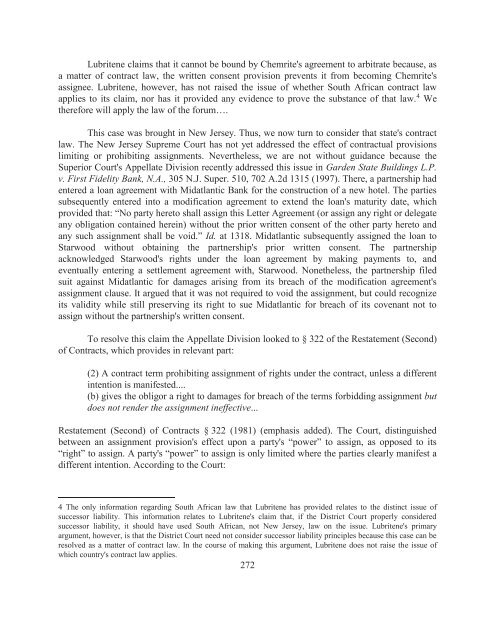Sales and Leases - A Problem-based Approach, 2016a
Sales and Leases - A Problem-based Approach, 2016a
Sales and Leases - A Problem-based Approach, 2016a
You also want an ePaper? Increase the reach of your titles
YUMPU automatically turns print PDFs into web optimized ePapers that Google loves.
Lubritene claims that it cannot be bound by Chemrite's agreement to arbitrate because, as<br />
a matter of contract law, the written consent provision prevents it from becoming Chemrite's<br />
assignee. Lubritene, however, has not raised the issue of whether South African contract law<br />
applies to its claim, nor has it provided any evidence to prove the substance of that law. 4 We<br />
therefore will apply the law of the forum….<br />
This case was brought in New Jersey. Thus, we now turn to consider that state's contract<br />
law. The New Jersey Supreme Court has not yet addressed the effect of contractual provisions<br />
limiting or prohibiting assignments. Nevertheless, we are not without guidance because the<br />
Superior Court's Appellate Division recently addressed this issue in Garden State Buildings L.P.<br />
v. First Fidelity Bank, N.A., 305 N.J. Super. 510, 702 A.2d 1315 (1997). There, a partnership had<br />
entered a loan agreement with Midatlantic Bank for the construction of a new hotel. The parties<br />
subsequently entered into a modification agreement to extend the loan's maturity date, which<br />
provided that: “No party hereto shall assign this Letter Agreement (or assign any right or delegate<br />
any obligation contained herein) without the prior written consent of the other party hereto <strong>and</strong><br />
any such assignment shall be void.” Id. at 1318. Midatlantic subsequently assigned the loan to<br />
Starwood without obtaining the partnership's prior written consent. The partnership<br />
acknowledged Starwood's rights under the loan agreement by making payments to, <strong>and</strong><br />
eventually entering a settlement agreement with, Starwood. Nonetheless, the partnership filed<br />
suit against Midatlantic for damages arising from its breach of the modification agreement's<br />
assignment clause. It argued that it was not required to void the assignment, but could recognize<br />
its validity while still preserving its right to sue Midatlantic for breach of its covenant not to<br />
assign without the partnership's written consent.<br />
To resolve this claim the Appellate Division looked to § 322 of the Restatement (Second)<br />
of Contracts, which provides in relevant part:<br />
(2) A contract term prohibiting assignment of rights under the contract, unless a different<br />
intention is manifested....<br />
(b) gives the obligor a right to damages for breach of the terms forbidding assignment but<br />
does not render the assignment ineffective...<br />
Restatement (Second) of Contracts § 322 (1981) (emphasis added). The Court, distinguished<br />
between an assignment provision's effect upon a party's “power” to assign, as opposed to its<br />
“right” to assign. A party's “power” to assign is only limited where the parties clearly manifest a<br />
different intention. According to the Court:<br />
4 The only information regarding South African law that Lubritene has provided relates to the distinct issue of<br />
successor liability. This information relates to Lubritene's claim that, if the District Court properly considered<br />
successor liability, it should have used South African, not New Jersey, law on the issue. Lubritene's primary<br />
argument, however, is that the District Court need not consider successor liability principles because this case can be<br />
resolved as a matter of contract law. In the course of making this argument, Lubritene does not raise the issue of<br />
which country's contract law applies.<br />
272


















